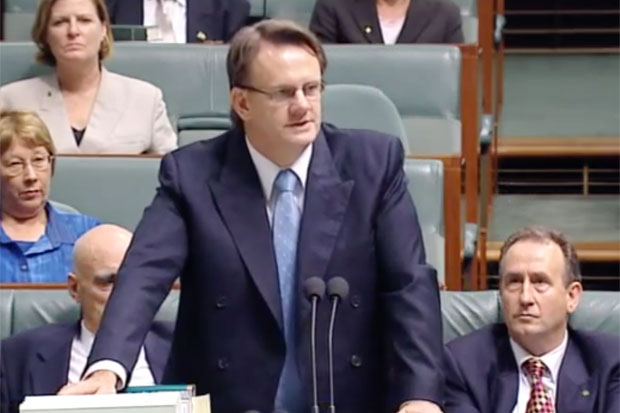Mark Latham’s self-immolation at the Melbourne Writers Festival last weekend raises important questions about what we can and should expect from politicians and public figures more generally.
“Melbourne Writers Festival was disappointed in Mark Latham’s appearance today,” said the obviously shell-shocked organisers afterward. “It was not the respectful conversation we value.”
You can see their point. By ostentatiously misgendering Catherine McGregor, and semi-anonymously trolling female journalists, Latham seems determined to show his metamorphosis from right-wing Labor leader to 4chan attention-seeker is now complete.
Yet many of the newspaper accounts of the session seem offended not by his bigotry but rather his profanity.
“Mark Latham’s foul tirade shocks audience at Melbourne Writers’ Festival 2015,” explained the Herald Sun in its headline.
Seriously? The attendees might have been taken aback by the abuse hurled at the crowd (and at Jonathan Green, the long-suffering session chair), but were their delicate sensibilities really shocked by the Latham’s potty mouth?
No doubt it wasn’t exactly edifying hearing the former Opposition Leader chant “f***, c***, poo, bum” like a hyperactive toddler, but, in the age of Charlotte Roche and Michel Houellebecq, there’s something distinctly odd in suggesting a few salty phrases would offend the readers of contemporary literature.
The focus on Latham’s rudeness depoliticizes the offense taken by many at his bigotry, transforming his transphobia into a mere lapse of etiquette. Instead of justified anger at a powerful man hating on an oppressed minority, we end up with a tut-tutting disapproval of curse words.

For an illustration of why that matters, recall that, only a day earlier, the Australian’s media commentator Sharri Markson had suggested that Latham’s language provided a precedent for the sacking of Fairfax commentator Clementine Ford, on the basis that Ford, too, occasionally swears.
Now, Ford campaigns for women’s rights and Latham (to put it diplomatically) doesn’t. But, by presenting the outrage at Latham’s bigotry as an anger about vulgarity, Markson can use the opposition to sexism to… attack a feminist.
For Ford’s been known to drop the C-word, too – and so, if the public sphere’s to be ruled by the Manual of Politeness, she’s just as guilty as Latham. Meanwhile, Markson gives a free pass to the Telegraph’s Tim ‘Frightbat’ Blair, who, despite having more issues with women than Norman Bates, assures the Oz that he never works blue.
You see the problem?
In any case, while literary festivals shouldn’t provide bully pulpits for bigots, what exactly do we mean by wanting “respectful conversations”?
The fracas on Friday will be the most talked about writers’ event for years, not merely because everyone likes rubbernecking at a car crash, but also because it contrasted so sharply from the many literary conversations that are so respectful as to be completely anodyne, along the lines of “My book is great, your book is great, too – see you in the signing queue.”
That’s not meant as a defense of Latham, more a suggestion as to how Latham-style trolling might be overcome.
The biggest problem with public debate, whether at festivals or in parliament or in television, is not that there’s too much argumentation but rather that there’s so very little, at least when it comes to topics of substance.
Only a few months ago, a young man called Zaky Mallah made an entirely unexceptional point about the relationship between ISIS and government policy on the ABC’s QandA program. The resulting hysteria – multiple investigations into the public broadcaster; an offer from the AFP to run background checks on all future participants, etc – revealed the extraordinary hostility of the political class to any discussion that veers even slightly off script.
Instead of a debate about Mallah’s question, we ended up with an argument about how to protect politicians on a semi-scripted TV show from unexpected interlopers.
Since then, we’ve had more concocted indignation about a twitter handle that flashed briefly on screen during last Monday’s program.
After the usual suspects rent their garments in apoplexy, the PM declared QandA “out of control”’ – and the ABC immediately declared that the program would no longer show live tweets. Again, even the vanishingly small element of public participation represented by (already curated and monitored) tweets has proved too much for politicians and their courtiers.
It’s that absence of genuine contestation – real fights over real issues – that gives rise to people like Latham (and, for that matter, Donald Trump), trolls who tap into the increasingly widespread fascination with anything, no matter how crass or boorish, that punches through the empty façade.
Which is why we should guard, in the wake of Lathamgate, against inevitable attempts to police the bounds of the permissible even further.
Latham presents himself as an outsider. He’s not. At the writers’ festival, he behaved like a bully, a wealthy ex-politician using his position to intimidate those around him.
But the way to prevent similar antics is not to police events more closely but to open them up more extensively.
When we have a public culture in which genuine outsiders can speak on their own behalf, trolling will lose its shock value – and perhaps then we can debate issues that really matter.
Donate To New Matilda
New Matilda is a small, independent media outlet. We survive through reader contributions, and never losing a lawsuit. If you got something from this article, giving something back helps us to continue speaking truth to power. Every little bit counts.




